Research Associate Program
Research Associates are HBI affiliates who carry out projects that support the institute’s mission. HBI provides RAs with academic oversight, access to HBI and the resources of Brandeis University. RAs are expected to play an active part in the intellectual life of the institute and the university. This includes attending and presenting in the Institute Seminar, attending other lectures and workshops as appropriate, and giving a public talk. Scholars may also be asked to contribute a discussion of their work to the HBI blog Fresh Ideas from HBI.
HBI does not provide RAs with assigned work space at the institute or with financial support. Individuals may, however, apply for funding through any of the HBI programs. Applications to the Research Associate program are by invitation only and may be renewed annually upon submission of an annual report describing the research associate's contributions to the life of the institute and progress on their own research.
2025-26 Research Associates
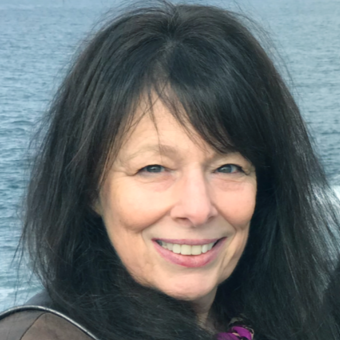
Ornit Barkai is a documentary filmmaker whose areas of research cover gender, culture, identity, and memory. Her cinematographic work offers intergenerational, multicultural perspectives on narratives of social memory and memorialization, identifying gaps between historical events and memory. As a digital storyteller, she utilizes new media platforms and emerging technologies to create interactive and dynamic content.
Barkai is a research associate and former scholar-in-residence at the Hadassah-Brandeis Institute and Affiliated Scholar at the Women’s Studies Research Center at Brandeis University. She presents internationally at academic conferences and educational settings. Her review of the book, “Tme'im, the Trade in Women in Argentina and in Israel,” was published by the Latin American Jewish Studies Association. Barkai holds a master’s degree in media and mass communication from Emerson College.
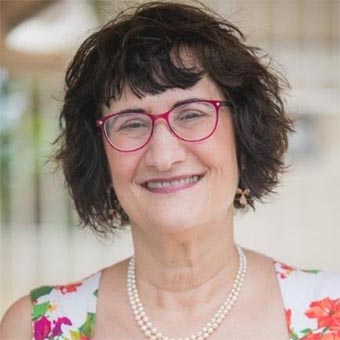
Edna Barromi-Perlman is a senior lecturer at the Department of Visual Literacy at Kibbutzim College of Education in Israel. Barromi-Perlman is a Research Fellow of the Institute for Research of the Kibbutz and the cooperative idea in the University of Haifa, and Research Associate at the Hadassah-Brandeis Institute. Her research focuses on archival photographs in Palestine and Israel, personal albums and the use of photography in education. Her work appears in academic journals such as "Social Semiotics," "Journal of Israeli History," "Journal of Visual Literacy," "Journal of Landscape Ecology," "Journal of Media and Religion", "International Journal of Qualitative Methods" and "Photography and Culture." Her paper on "Images of Italian Jewish Emancipation: An Analysis of Family Photographs after the Opening of Roman Ghetto in 1870" will be published in 2024 in "Journal of Jewish Sociology". She received her doctorate at the University of Sussex, and her MFA at Goldsmiths College in the UK. The book Barromi-Perlman co-edited, Visual Pedagogies, Concepts, Cases and Practices was published in 2023.
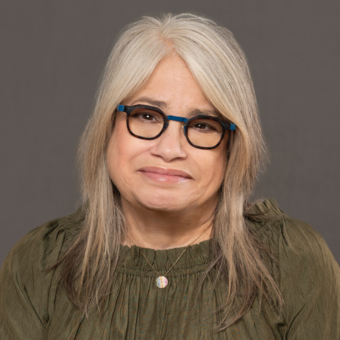
Judy Bolton-Fasman is the author of Asylum: A Memoir of Family Secrets from Mandel Vilar Press (2021). "Hadassah Magazine" praised the book as a "tender, poetic and suspense-filled memoir." "The Forward" called Asylum "a beautifully written family memoir."
Bolton-Fasman's essays and reviews have appeared in major newspapers, including the "New York Times" and "Boston Globe," essay anthologies, and myriad literary magazines. A graduate of Grub Street's Memoir Incubator, Bolton-Fasman is the recipient of writing fellowships from Hedgebrook, the Mineral School in Washington state, the Vermont Studio Center, and was awarded the Alonzo G. Davis Fellowship for Latinx writers at the Virginia Center for Creative Arts. She has an MFA from Columbia University.
Bolton-Fasman was a long-time arts and culture writer for JewishBoston.com. She is a five-time winner of the Rockower Award from the American Jewish Press Association and a two-time Pushcart Prize and Best of the Net nominee. Her work has been recognized in literary essay contests sponsored by "Tiferet" and "Hypertext Magazines."
At HBI, Bolton-Fasman will be working on her second memoir, The Book of Matilde: A Sephardic Daughter-Mother Memoir, in which she portrays her complicated Cuban mother, Matilde. The book explores the influence of Matilde's Sephardic heritage and Cuban identity on Bolton-Fasman's life. She will also explore how gender expectations in mid-century Cuba contributed to her mother's emotional challenges. The memoir will incorporate genealogical research, Cuban and Sephardic-Jewish history, and showcase Judy's mother's attempts to work around her strict Sephardic upbringing.
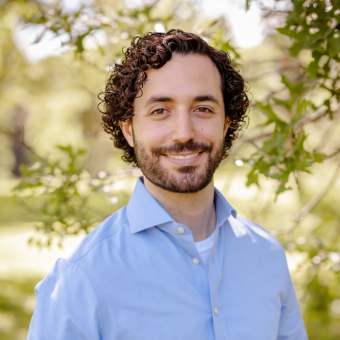
Passing Fancies: Jewish Specters and Chimeric Liberation in U.S. Passing Films
Jonathan Branfman, Ph.D., (he/him) is a scholar of media, race, gender, and Jewish identity who analyzes how an eight-century lineage of antisemitic bodily stigmas intersects today with America's color-based racial categories. His forthcoming book, Millennial Jewish Stars: Navigating Racial Antisemitism, Masculinity, and White Supremacy (June 2024), asks what makes millennial Jewish stars so unexpectedly appealing after Jewish stars have long faced pressure to downplay Jewish identity for fear of alienating wider audiences, and what can their surprising success tell us about race, gender, and antisemitism in America?
Branfman received his Ph.D. in Women’s, Gender, and Sexuality Studies at The Ohio State University in 2019 and has most recently been the Eli Reinhard Postdoctoral Fellow in Jewish Studies at Stanford University. From 2020 to 2022, Branfman was Visiting Assistant Professor, jointly appointed in Jewish Studies and English, at Cornell University, and from 2019 to 2020, Visiting Assistant Professor, jointly appointed in Film & Media Studies and Gender, Sexuality, & Women’s Studies at the College of William & Mary.
A past HBI Scholar in Residence, Branfman will be working on his second book, Passing Fancies: Jewish Specters & Chimeric Liberation in U.S. Passing Films, which reveals an unstudied synergy between films about Jewish, racial, gendered, sexual, and classed “passing,” such as Mrs. Doubtfire (1993), Blackkklansman (2018), Yentl (1983), and Gentleman’s Agreement (1947). Spanning from the classical Hollywood era to the present, this research newly clarifies how such disparate films cohere into one passing genre that performs one persistent ideological service: to help dominant audiences feel pleasurably enlightened while actually renewing their own privilege over multiple outgroups. By deciphering these ideological mechanisms, Passing Fancies opens new dialogues between Jewish studies, gender studies, critical race studies, and film studies.
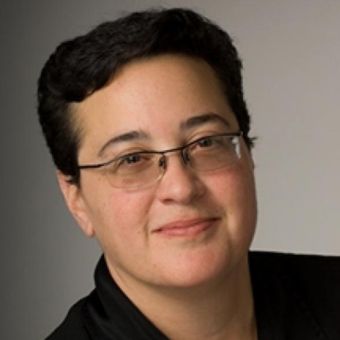
Marla Brettschneider, Ph.D., is a professor of political theory with a joint appointment at the University of New Hampshire in Women’s Studies and Political Science where she has chaired both of her departments. A builder of Feminist Studies Programs (undergraduate and graduate), she is a founder at UNH of Queer Studies and the Social Justice Leadership Minor and is active in the Race, Culture and Power Program.
Brettschneider teaches, lectures and publishes widely in Jewish feminist diversity political theory, looking at issues of contemporary Jewish politics through the co-constructed analytic paradigms of feminist, queer, critical race, class-based and de-colonial studies. She has published extensively (in addition to numerous special issues of academic journals, her books include: "LGBTQ Politics: A Critical Reader," "Cornerstones of Peace: Jewish Identity Politics and Democratic Theory," "The Jewish Phenomenon in Sub-Saharan Africa," and "Africana Jewish Journeys") with numerous award winning / critically mentioned books such as "Jewish Feminism and Intersectionality," "The Family Flamboyant: Race Politics, Queer Families, Jewish Lives" and "The Narrow Bridge: Jewish Views on Multiculturalism" with a forward by Cornel West. Brettschneider most recently edited "The Hidden Jewish Communities of Ethiopia" and "Jewish Lesbian Scholarship in a Time of Change."
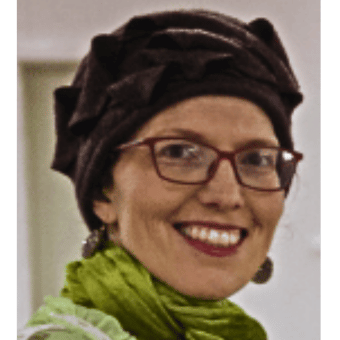
"Selfie of her Own" - Feminine Identity in Orthodox Women’s Comics in Israel and Western Communities - a comparative study
Noa Lea Cohn, PhD, is an Art lecturer at Efrata College in Jerusalem where she specializes in creative education for women. She is also a researcher at the Mofet Institute, researching the use of visual art among Ultra-Orthodox women teachers and their influential roles within their communities. Her research positions these women as key agents of change through their artistic practices.
Cohn’s academic journey includes a doctorate from Bar Ilan University, supported by a President’s Fellowship. Her dissertation, “Kabbalistic Representations in the Work of Contemporary Jewish Artists Drawn to Orthodoxy in Israel,” received an honorable mention from the Israeli Association for the Study of Religions (IASR). Her dissertation explores the American “Baal Teshuva” artists, who experienced a heightened mystical spirituality in the 1960s that led them to traditional Jewish observance. She identifies their artistic output as “Visionary Jewish Art,” a term she coined to describe their unique contributions. In addition to her academic achievements, Dr. Cohn held a fellowship at the Mandel Programs for Leadership Development in the Haredi Community through which she served as a curator and social entrepreneur, founding the first Haredi gallery, ArtShelterGallery.
A past HBI Scholar in Residence, Cohn will be investigating the cultural and religious tensions among Orthodox and Ultra-Orthodox women comic artists. This pioneering work addresses an understudied area in the art world, contributing new scholarship in this burgeoning field.
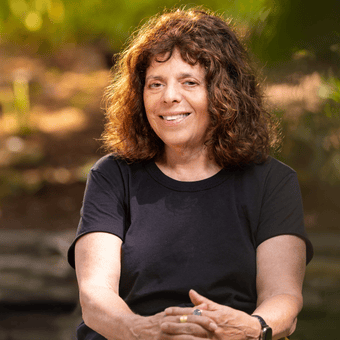
Karen Frostig is a public memory artist, writer, cultural historian, feminist activist, Professor at Lesley University, Research Associate at the Hadassah-Brandeis Institute and Scholar at the Women’s Studies Research Center at Brandies University. Frostig is the Founding Director and producer of the Locker of Memory memorial project (2019-) dedicated to restoring history and memory to the Nazi “Jungfernhof” Concentration Camp located three miles outside of Riga, Latvia’s capital city. Her grandparents were among 3985 Jewish victims deported to the camp and murdered at the site or in nearby forests. In 2025, Latvia’s Jewish community commissioned Frostig to serve as lead artist, developing the concept and design for a permanent memorial object to be installed at the camp. She will be distinguished as the first woman artist and the first descendant appointed to create a full-scale Holocaust memorial in Latvia. Frostig’s research will encompass the design of a Mourning Shroud for mass murder as a commemorative object containing feminist values about community, connection and sense of belonging; and gendered politics surrounding memorial culture in Latvia.
Frostig was the executive director and producer of the “Day of Remembrance”, an international program featured in the 2024 Bernstein Festival of the Creative Arts at Brandeis University. She was the director of The Vienna Project (2013-2014), Vienna’s first naming memorial representing seven different victim groups presented in 16 districts in Vienna. Frostig has published numerous articles on topics concerning Holocaust memory in public space, social justice and activism from a feminist perspective; featured in national and international exhibitions; and is a frequent keynote speaker to international audiences in Europe and the US. In 2023, Frostig presented her family’s history and her work at the United Nations General Assembly on Holocaust Remembrance Day and received national attention in the Sunday edition of the New York Times and other major newspapers.
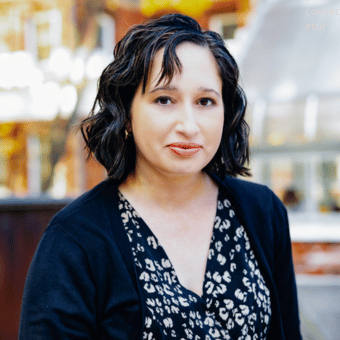
Rachel B. Gross is Associate Professor and John and Marcia Goldman Chair in American Jewish Studies in the Department of Jewish Studies at San Francisco State University. She is a religious studies scholar who studies twentieth- and twenty-first-century American Jews. Her book, Beyond the Synagogue: Jewish Nostalgia as Religious Practice (NYU Press) was a 2021 National Jewish Book Award finalist in American Jewish Studies and received an Honorable Mention for the 2021 Saul Viener Book Prize, given by the American Jewish Historical Society.
As a Scholar in Residence at HBI, Gross worked on a religious biography of the twentieth-century American Jewish writer Mary Antin. Once one of the most famous Jewish women in the United States, Antin shaped American conversations about immigration and religious identity with her 1912 autobiography The Promised Land, which depicted her immigration from Russia to the United States as a religious experience. Wanderings of the Spirit will use Antin’s celebrity and her spiritual journeys to explore her religious worlds. Antin’s wide-ranging spiritual adventures tell us about the possibilities of twentieth-century American Jewish women’s identities and the boundaries of religious communities.
Gross wrote about the persistence of Antin’s Jewish identity even as she explored non-Jewish religions in an article in AJS Perspectives (Winter 2024: The Conversion Issue), "I Don’t Care What I Am Called": Mary Antin and the Boundaries of Religious Identity.” With HBI research award grant recipient Sarah Imhoff, Gross co-authored a journal article on Mary Antin’s friendship with the Zionist writer Jessie Sampter, Friends Are the Cream of Life: Mary Antin and Jessie Sampter’s Religious Creativity, in Religion and American Culture (February 2025).
photo credit: Christine Kreschollek
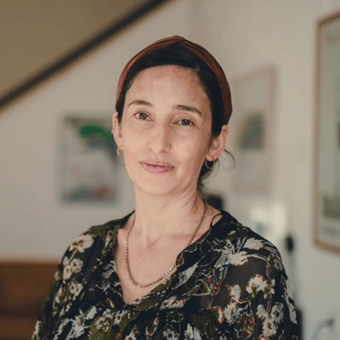
"Confusion Between the Language of Ḥesed and the Language of Passion": Misidentification of Sexual Abuse among Ultra-Orthodox Jewish Women
Dr. Nehama HaCohen is a clinical psychologist specializing in the treatment of sexual trauma and culturally sensitive psychotherapy. She is a faculty member at Achva Academic College in Israel where she leads a research lab focused on multicultural identities. She also lectures in the psychology program at Bar-Ilan University. Her multidisciplinary research spans topics such as women's health and psychological perspectives on ultra-Orthodox society. Dr. HaCohen is also a founding member of the Briah Foundation, an organization dedicated to improving women’s health in Israel. Through all these endeavors, her work aims to contribute meaningfully to mental health knowledge, practices, and policies, always through a culturally sensitive lens.
A past HBI Scholar in Residence, HaCohen will be examining "the Language of Ḥesed" as an explanation for the misidentification of sexual abuse among ultra-Orthodox Jewish women. The study offers a new lexicon which rejects deeply ingrained cultural, religious, and linguistic values that shape the consciousness of ultra-Orthodox women in order to impact therapeutic practices and community awareness regarding sexual trauma while respecting cultural context and avoiding the perpetuation of patterns of acquiescence.
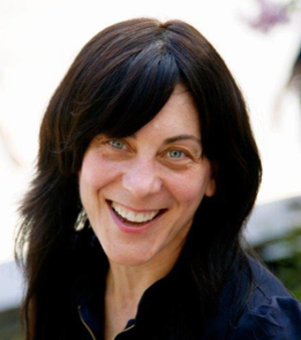
Viva Hammer has had an illustrious career in tax policy, at the Treasury Department's Office of Tax Policy as well as advising Congress as legislation counsel during the Tax Cuts and Jobs Act. She has been partner in both a major DC law firm and a Big Four accounting firm.
Viva has been researching human fertility for 20 years. The question that drives her work is why Orthodox Jewish family sizes have grown in the last 50 years, while non-Orthodox family sizes have fallen. She is interested in what high Orthodox fertility can teach us about the global decline in fertility in the last 200 years. Viva's article, “BIRTH CONTROL NARRATIVES: Jewish Women and the Law of Reproduction”, was published in the “UCLA Journal of Gender and Law” in March 2024.
Viva has written extensively in both professional and popular forums, including as regular columnist for the Jerusalem Post.
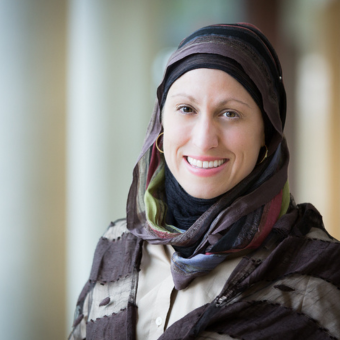
Muslim Attitudes on Reproductive Justice
Celene Ibrahim, Ph.D., is a scholar of Islamic intellectual history and applied ethics. Her articles on theology, Islamic jurisprudence, spiritual care, and religion in public life have appeared in dozens of academic and popular publications. She is the author of “Islam and Monotheism” (Cambridge University Press, 2022) and “Women and Gender in the Qur'an” (Oxford University Press, 2020), which won the Association of Middle East Women's Studies Book Award and was a featured title for Women's History Month by the American Academy of Religion. She is the editor of the anthology “One Nation, Indivisible: Seeking Liberty and Justice from the Pulpit to the Streets” (Wipf & Stock Publishers, 2019).
Ibrahim currently serves as a faculty member in Groton School’s Department of Religious Studies. She studied Near Eastern Studies at Princeton University and pursued leadership training in Islamic studies at Harvard Divinity School. She earned a doctorate in Arabic and Islamic Civilizations at Brandeis University and is particularly honored to be returning to the Hadassah-Brandeis Institute to conduct research on Islamic reproductive ethics for the Project on Gender, Culture, Religion and the Law.
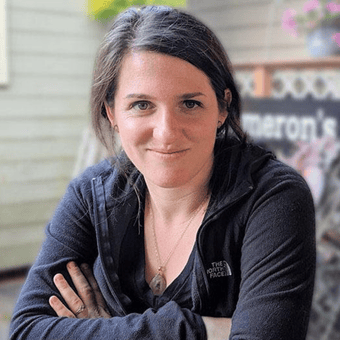
Delivering Knowledge: Jewish Midwives and Hidden Healing in Early Modern Europe
Jordan Katz is Assistant Professor of Judaic Studies at University of Massachusetts Amherst. She received her PhD in History from Columbia University in 2020. Katz has received fellowships from the Memorial Foundation for Jewish Culture; the Consortium for History of Science, Technology and Medicine; the Center for Jewish History, and the Women's Studies in Religion Program at Harvard Divinity School. Her work has been published in Jewish Quarterly Review, Jewish Social Studies, and in Be Fruitful! The Etrog in Jewish Art, Culture, and History.
A past HBI Scholar in Residence, Katz will complete her current book project, “Delivering Knowledge: Jewish Midwives and Hidden Healing in Early Modern Europe”.
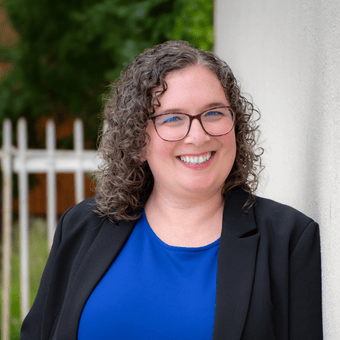
Jewish Community Farming, the Climate Crisis, and the Future of Judaism
Adrienne Krone is Associate Professor of Environmental Science & Sustainability and Religious Studies at Allegheny College. She has a PhD in American religion from Duke University, and her research focuses on religious food justice movements in North America. She has published a number of articles and book chapters on this topic and her first book, “Free Range Religion: Religious Food Justice Movements in North America”, is under contract with UNC Press. Her current research project is an ethnographic and historical study of the Jewish community farming movement.
A past HBI Scholar in Residence, Krone will be working on her forthcoming book, tentatively titled “Jewish Community Farming, the Climate Crisis, and the Future of Judaism”, drafting chapters highlighting women and gender dynamics within the Jewish Community Farming movement and the innovative and collaborative nature of the Jewish community farming movement. In her research on this relatively new and still marginal movement, she has found that distance from mainstream Jewish institutions and the inclination towards innovation have provided generative space for women, trans, and non-binary Jews to find each other, develop Jewish identities that blend ancient wisdom with contemporary feminism, and thrive.
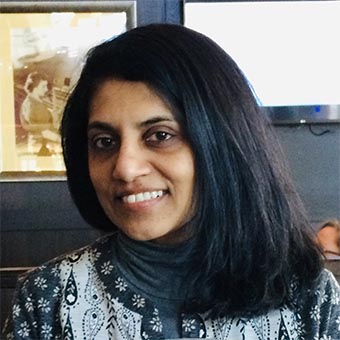
Bindu Malieckal, Ph.D., is a professor and chairperson of the English Department at Saint Anselm College, New Hampshire. Malieckal’s areas of specialty include Anglophone and Lusophone literatures, with a focus on examinations of Jews, Muslims, Africans, peoples from India and women within all these groups. With regard to early modern Jewry and literature, she has published pieces on Jews in English drama and Jews in histories of Portugal and India, and her work has addressed Jews in postcolonial texts. Of the last, Malieckal’s current project is on the writings of India’s Jewish women, from memoirs and ethnographies to fiction and art.
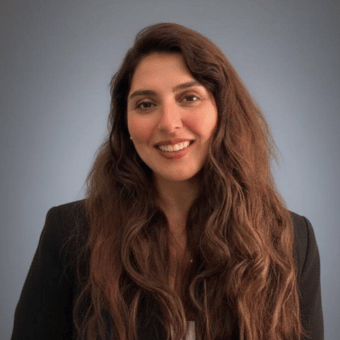
Katayoun Matloubi is a scholar of French and Francophone Studies and the theorist of rhetorics of obliquity. Her work examines the intersection of gendered memory, visual culture, and the ethics of testimony. She earned her PhD from the University of Connecticut, where she also holds a Graduate Certificate in Human Rights. Her research investigates how historical catastrophe is represented through oblique strategies—fragmentation, silence, and narrative restraint—that resist the voyeuristic objectification of suffering.
As a Research Associate at the Hadassah-Brandeis Institute, Dr. Matloubi is developing her monograph, Remembering Through Obliquity: Gendered Strategies of Silence, Visuality, and Ethical Withholding. During the period of her appointment, she analyzes the postwar literary trilogy of Anna Langfus in dialogue with contemporary cinema to articulate a cross-media grammar of indirect testimony. Her current work also creates a bridge with the HBI exhibition Who Will Draw Our History?, exploring how Jewish women across media use symbolic compression and selective omission to sustain the transmission of memory when indexical records are absent.
Dr. Matloubi’s scholarship engages with the ethics of representation in the digital age, particularly the impact of AI and digital discourse on the distortion of historical narratives. Her work has been recognized by the United States Holocaust Memorial Museum and the Patti Parlette Peace Prize. A multilingual scholar, she conducts research in French, German, Azeri, Persian, English, and Ottoman Turkish.

Keren R. McGinity. PhD, is the interfaith specialist at United Synagogue of Conservative Judaism. Before coming to USCJ in 2020, Dr. McGinity was the inaugural director of the Interfaith Families Jewish Engagement graduate program at Hebrew College. Her books, Still Jewish: A History of Women & Intermarriage in America (NYU Press 2009), a National Jewish Book Award Finalist, and Marrying Out: Jewish Men, Intermarriage, and Fatherhood (Indiana University Press 2014), provided groundbreaking analyses about Jewish continuity by focusing on gender and change over time. Her third book project is titled “#UsToo: How Jewish, Muslim and Christian Women Changed Our Faith Communities” (Routledge, under contract).
McGinity’s advice and opinions have appeared in the “Forward,” “Lilith” and “Moment” magazines, the “New York Jewish Week,” “RitualWell," “Sh’ma,” the “Times of Israel'' and “eJewishPhilanthropy.” She earned her PhD in history from Brown University, where she was appointed as visiting assistant professor. McGinity was the Mandell L. Berman Postdoctoral Research Fellow in Contemporary American Jewish Life at the University of Michigan’s Frankel Center for Judaic Studies. She is a 2018 Forward 50 honoree for her clarion call for a Jewish response to the #MeToo movement, named on “Lilith" magazine's “7 Jewish Feminist Highlights of 2018” list and was a “JewishBoston” “Top Pick”.
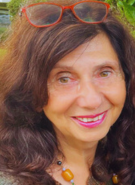
Prof. Joanna Beata Michlic is an author and an internationally acclaimed social and cultural historian specializing in the history of the Holocaust and its memory in Europe, East European Jewish childhood, rescue of Jews, and antisemitism and nationalism in Europe.
Michlic is a Senior Honorary Fellow at the Institute of Education, Practice and Society (EPS), UCL and Affiliate Faculty in Gratz College's Holocaust and Genocide Studies, and Antisemitism Studies Departments. She is also founder of the HBI Project on Families, Children and the Holocaust and a past visiting professor in Holocaust and Contemporary history at Lund University. In 2025, Michlic received the prestigious Yad Vashem Fellowship. Her many award-winning books on antisemitism and memorialization of the Holocaust include Poland's Threatening Other: The Image of the Jew from 1880 to the Present (University of Nebraska Press, 2008), Bringing the Dark Past to Light: The Reception of the Holocaust in Postcommunist Europe (University of Nebraska Press, 2013) co-edited with John-Paul Himka
Among her major book publications on Jewish childhood during the Holocaust and its aftermath, and children war and genocide are Jewish Family 1939 –Present: History, Representation, and Memory, (Brandeis University Press,, 2017 in the HBI Series on Jewish Women); Childhood During War and Genocide: Agency, Survival and Representation, European Holocaust Studies, vol. 5, Spring 2024; and Shattered Liberation: Sexual Violence Against Holocaust Survivors (1943-1946) (Purdue University Press, 2025, co-edited with Anna Cichopek-Gajrar and Nina Paulovicova). Her forthcoming publication is Through the Eyes of Jewish Child Survivors from Poland: Family, War, Identity and Nationhood (University of Nebraska Press, May 2026).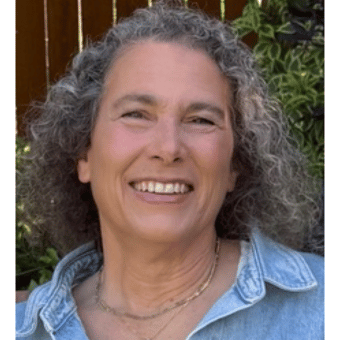
Rachel Munn is a Research Associate at the Hadassah-Brandeis Institute (HBI) at Brandeis University, Chair of the Holocaust Research Study Group (HRSG) at HBI, and Chair of the HBI Writers Group. She has a background in architecture, memorials and writing, exploring the intersection of place, memory, gender and history. Her current work traces the Holocaust at the kitchen table: motherhood, family Holocaust stories and a Holocaust inheritance.
Munn was previously a Resident and Affiliated Scholar at the Brandeis University Women’s Studies Research Center, has taught courses at Brandeis University, the Graduate Consortium in Women’s Studies at the Radcliffe Institute for Advanced Study, Harvard University, and the Wentworth Institute of Technology. She has also given guest lectures at several other colleges in the New England area. As a former Fulbright Fellow in Berlin, she looked at urban planning, memorials and memory of the Holocaust in Berlin. Munn earned a Bachelor of Arts degree from Princeton University in Anthropology, with a Certificate in Women’s Studies and a concentration in Creative Writing, and received a Master of Architecture degree from the Graduate School of Design at Harvard University. She worked professionally as an architect for many years in the Boston area.
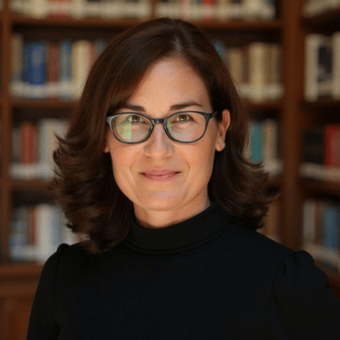
Rachel Perry teaches in the Weiss-Livnat Graduate Program for Holocaust Studies at the University of Haifa. Her research straddles the fields of art history, visual culture, and Holocaust studies, focusing on the representation and memory of the Holocaust in the immediate postwar period and questions of ethics, exhibition design, and cultural diplomacy. She is the recipient of fellowships from EHRI, the Getty, the Center for Advanced Studies in Visual Arts, Yad Vashem, the Dedalus Foundation, the Hadassah Brandeis Institute and the Fondation pour la Mémoire de la Shoah. Her articles have appeared in October, History and Memory, Holocaust Studies: A Journal of Culture and History, French Cultural Studies, RIHA, Art Bulletin, Ars Judaica, MIEJSCE, the Journal of Holocaust Research, Images: A Journal of Jewish Art and Visual Culture and Holocaust and Genocide Studies.
Perry’s current project examines graphic albums and artwork created by Jewish women survivors of the Holocaust. She is particularly interested in the perspective of gender and how it impacted and shaped early Holocaust research institutions and artistic initiatives. At HBI, Perry will be working on her manuscript which will consist of six chapters, one on each survivor artists: Ágnes Lukács, Edith Bán Kiss, Elżbieta Nadel, Regina Lichter-Liron, Zofia Rosenstrauch, and Luba Krugman Gurdus.
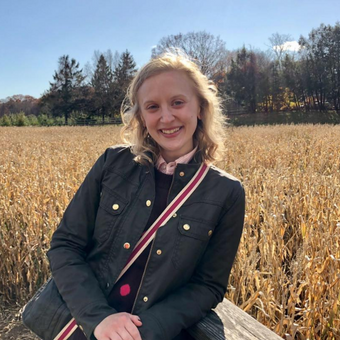
Samantha Pickette is the Assistant Director of Brandeis University Hillel. She has a Ph.D. in American Studies from Boston University, where she was a graduate affiliate with the Elie Wiesel Center for Jewish Studies. Her research focuses on Jewish-American culture, with a particular emphasis on representations and stereotypes of Jewish women in American literature, film, television and comedy. She has taught courses at BU, Brandeis, Smith College, and UT Austin, where she served as Assistant Director of the Schusterman Center for Jewish Studies. Her work has been published in Shofar, Studies in American Jewish Literature (1 and 2), The Journal of Modern Jewish Studies, and Jewish Film and New Media among others. Her first monograph, Peak TV’s Unapologetic Woman: Exploring Jewish Female Representation in Contemporary Television Comedy, was released by Lexington Books in 2022.
Pickette is currently working on a book manuscript tentatively titled Bridging the JAP: Funny Jewish Women and the Reframing of Jewish Femininity in American Pop Culture, which explores the 1970s as a critical turning point for the self-representation of young Jewish women in American literature, film, television and comedy.
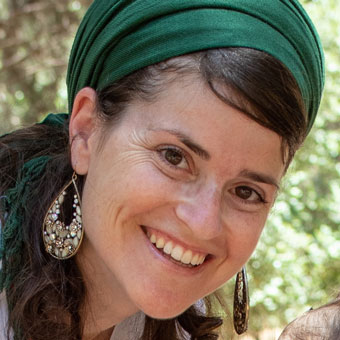
Moria Ran received her PhD from Bar Ilan University in The Land of Israel and Archaeology. Her dissertation was titled “The Individual, the Feminine and the Public: The Portrait of Professor Alice Shalvi and Her Enterprises as a Reflection of the Development of Women’s Status in Israeli Society.” She also studied at Bar Ilan’s seminary for women, The Midrasha for Women and at Midrashet Lindenbaum, focusing on Talmud. She teaches academic writing at the Open University of Israel. Before this, she was a coordinator of a workshop titled, “Religious Women and Researchers,” and she taught at Pelech High School for girls in Tel Aviv. She was at HBI as a scholar in residence for the 2019-2020 academic year, working on research that examined the journey in Orthodox feminism in Israel and the United States, looking at both Kolech and JOFA.
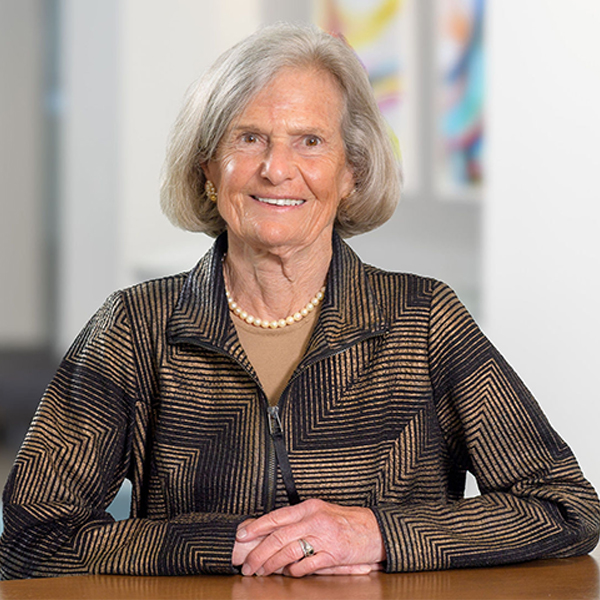
Anita Robboy is an attorney who has spent the last 46 years practicing law, primarily in medium and large size Boston law firms. Robboy’s legal research is focused on the complex issues and laws relating to assisted reproductive technology in Britain, Germany, France, Italy and Sweden. Robboy has written “Aftermarriage: the Myth of Divorce,” authored one historical article and written numerous legal articles on aspects of family law. In addition to practicing law and engaging in professional writing, Robboy participates in volunteer legal opportunities with Volunteer Lawyers Project in Boston and Senior Partners for Justice.
Robboy’s current project is the biography of her mother, Gisela Warburg Wyzanski, a German-born Jew who used her privileged position and passionate commitment to both children and Zionism to rescue thousands of Jewish youth during and immediately after World War II.
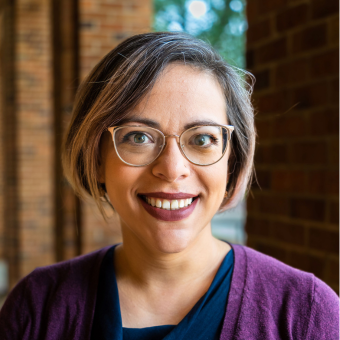
Fetal Positions: The Talmud Construction of Personhood
Dr. Sara Ronis (she, her, hers) is associate professor of Theology at St. Mary’s University, Texas, where she teaches courses in the Hebrew Bible and its reception, and Jewish Studies and religious studies more broadly. She holds a Ph.D. in ancient Judaism with specialization in the Talmud from Yale University, and a B.A. in Near Eastern and Judaic Studies from Brandeis University. Her research interests include rabbinic subjectivity and definitions of personhood, constructions of gender and authority in rabbinic literature, and rabbinic imaginings of and encounters with the other in late antiquity. Her first book, Demons in the Details: Demonic Discourse and Rabbinic Culture in the Babylonian Talmud (University of California Press, 2022), looks at demonic discourse in the Babylonian Talmud in its legal, narrative, and socio-cultural contexts. She has been a Harvard Center for Jewish Studies Visiting Research Scholar, and was a Fall 2022 scholar-in-residence at HBI.
Ronis is currently working on her next book project, Fetal Positions: The Talmud Construction of Personhood, which explores fetal personhood in the rabbinic world of late antiquity. Using close readings of primary texts from late antiquity together with analyses informed by insights from anthropology, critical animal studies, post-human studies, ethics, and legal history, this project explores how the rabbis use the fetus to think about what it means to be a living being, a human, and a Jew and offers new ways to think about how personhood is socially mediated and culturally constructed.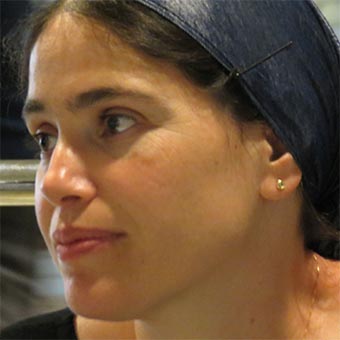
Dr. Rivka Neriya-Ben Shahar is currently a Ruth Melzer Fellow at the Katz Center for Advanced Judaic Studies at the University of Pennsylvania. In Israel, Neriyah-Ben Shahar is a scholar at the Israel Democracy Institute and a lecturer at Sapir Academic College in Sderot where she teaches courses on research methods, communication, religion, and gender. She was a Fulbright post-doctoral Fellow and HBI Scholar in Residence in 2011-12 and at HBI again in 2018. She also received HBI Research Awards in 2013 and 2020 for her projects about Jewish women rituals, and Ultra-Orthodox women and new media (respectively).
Dr. Neriya Ben-Shahar investigates mass media from the perspectives of religion and gender. Her research addresses the tensions existing between religious values and new technologies among women in Old Order Amish and Ultra-Orthodox Jewish communities. She has presented her research at more than 50 academic conferences and seminars in the United States and Israel and has published more than 20 papers. Several of her articles were published by "New Media and Society," "The Journal of Media and Religion," "Nashim" and "The Routledge Handbook of Jewish Ritual and Practice." Her book, "Strictly Observant: Amish and Ultra-Orthodox Jewish Women Negotiating Media," was published by Rutgers University Press in January 2024.
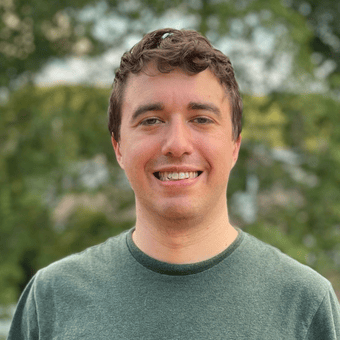
Two Worlds of Conservative Judaism: The Agunah Problem
Benjamin Steiner, an American Jewish historian, received his PhD in Near Eastern and Judaic Studies from Brandeis University. His first book, Translating the Ketubah: The Jewish Marriage Contract in America and England (University of Alabama Press, 2025), explores how translations of the ketubah into English illuminate the Jewish experience on both sides of the Atlantic. He has also published peer reviewed articles in Modern Judaism, American Jewish History, and American Jewish Archives Journal. He was an HBI scholar-in-residence in 2019 and an HBI graduate research intern in 2013. He served as visiting assistant professor in the Department of Religious Studies at Trinity College from 2021-2025. At HBI, Steiner will continue his exploration of the agunah problem in the Conservative movement, specifically the chasm between Orthodox and Reform leaning elements within Conservative Judaism’s own rabbinic ranks, and the mark that struggle left on the movement’s agunah legacy over a period of half a century.
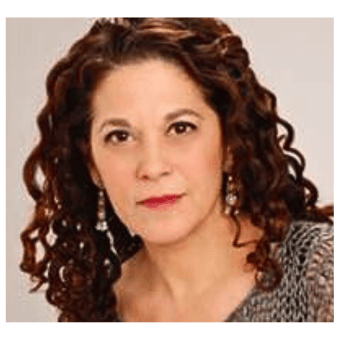
Music, Memory and the Holocaust: Frauenstimmen: Women’s Voices from the Ravensbrück Concentration Camp
Lynn Torgove is a student in the Tufts University Interdisciplinary Doctoral Program and focuses her work on the women prisoners and the music they composed and sang at the Ravensbrück Concentration Camp, located northeast of Berlin, through the lens of memory and performance studies. Her interest in the performance of European cabaret before and during World War II, led her to use Jewish Weimar cabaret as a format for presenting the lives and music of the prisoners at Ravensbrück. As a culmination of her dedication to this work, she created and performed in Frauenstimmen: Women’s Voices from the Ravensbrück Concentration Camp, A Musical Cabaret, funded by Northeastern University’s Holocaust Legacy Foundation Gideon Klein Award. The cabaret was premiered at the Fenway Center on the Northeastern University campus and has been performed at multiple venues in Boston and in Canada.
Torgove received her master’s degree in Jewish Studies, and Cantorial Ordination at Hebrew College in Newton, Massachusetts. After her ordination she was a member of the cantorial and rabbinical faculties at the college and later served as Director of the Cantorial Program. Prior to her work at Hebrew College, Torgove received her Master of Music at the Boston University School of Fine Arts and her undergraduate degree in Theatre at Tufts University. She is an accomplished musician, stage director and soloist and has performed across the United States and in Europe and Japan.
She has served on the faculties of Brandeis University, Tufts University, Boston Conservatory, the Opera Studio at Boston University, New England Conservatory and the Longy School of Music. She has also coached the Tanglewood Festival Chorus at Boston’s Symphony Hall and has written program notes for the Boston Symphony’s performance of Leonard Bernstein’s Kaddish Symphony no. 3. Ms. Torgove has been a guest teacher at synagogues and universities on the topics of Holocaust Music and Jewish Music Heritage across the country and in Europe.
Her current work is inspired by the scholar Shirli Gilbert, who writes in her book Music and the Holocaust, “The music is a unique legacy of the time: fragments of shared ideas and interpretation, orally conveyed and preserved, from communities that otherwise left few traces.’’
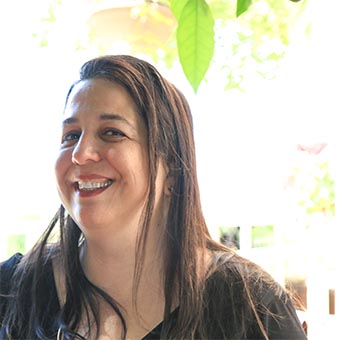
Ornat Turin's current research looks at Jewish women aged 75-90 who have been active members in the Israeli Communist Party for their entire adult lives. The aim is to document how these women describe and explain the choice to link their lives to an excluded political movement. Turin was a scholar-in-residence at HBI, Gender and the Teaching of Hebrew Language seminar in 2014, and received a senior lecturer rank in 2017.